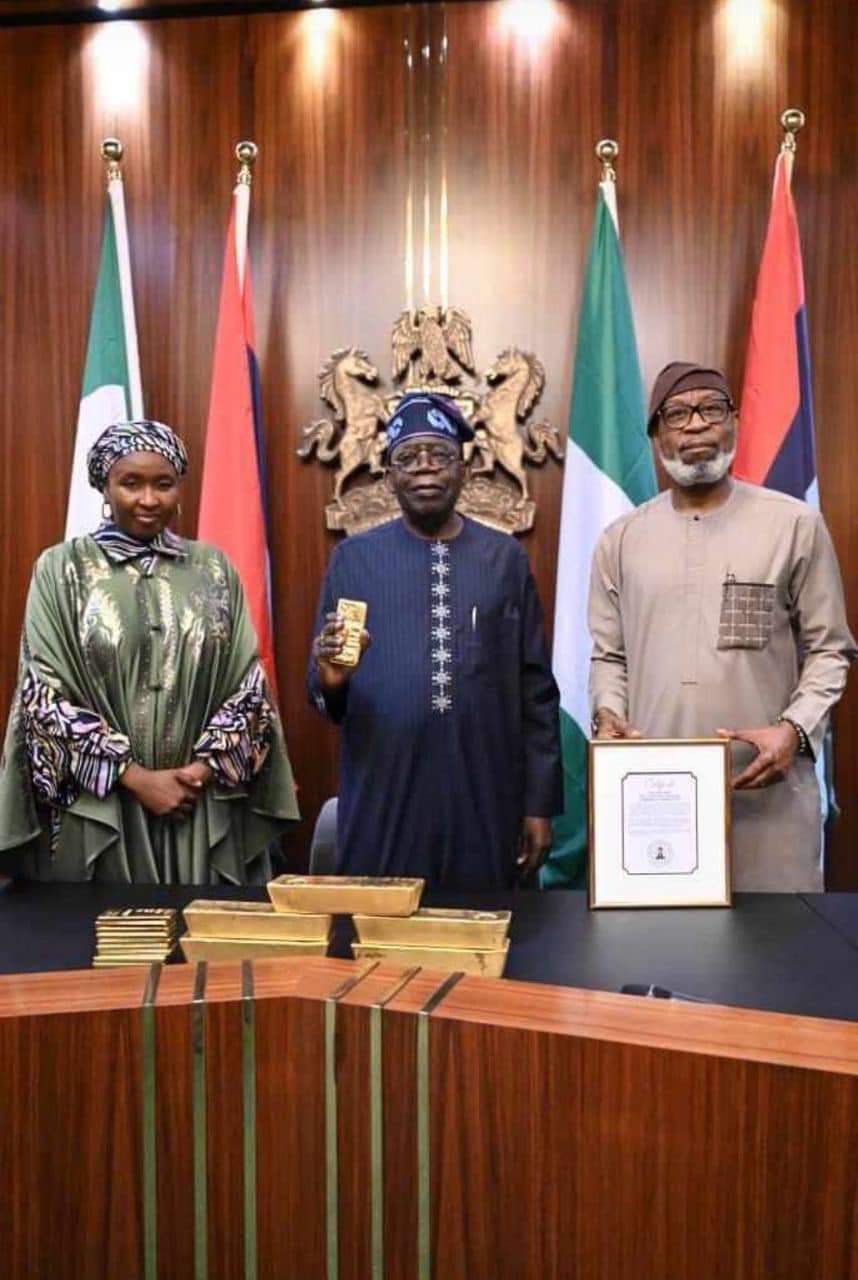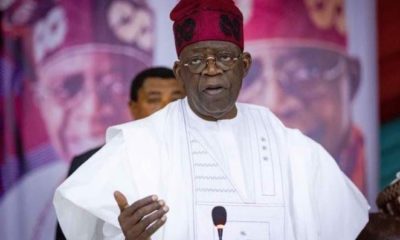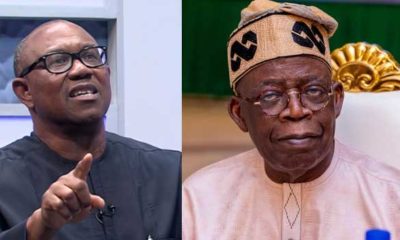NEWS
Nigeria set to boost foreign reserve and naira value with local gold production

President Bola Tinubu I am pleased to report that the National Gold Purchase programme, which aims to increase our country’s reserves and boost the value of the naira, is making significant progress.
Recently, I had the honor of presenting the latest gold bars to HE President Bola Ahmed Tinubu.
The bars were sourced from artisanal and small gold miners and refined by an agency of our Ministry, the Solid Minerals Development Fund. They have met the London Bullion Market Association Good Delivery Standard and will soon be sold to the Central Bank of Nigeria to strengthen our foreign reserves.
This marks the first commercial transaction under the National Gold Purchase Program (NGPP), which is a centralised offtake scheme supported by a decentralised aggregation and production network of artisanal and small-scale miners and cooperatives.
Furthermore, I am proud to announce that this first commercial transaction has resulted in a substantial increase of over US$5 million in Nigeria’s foreign reserves assets, the refinement of over 70 kilograms of gold to the London Bullion Market Good Delivery Standard, and the successful aggregation of locally mined gold, injecting around NGN6 billion into the rural economy.
The Honorable Minister of Solid Minerals .
Mr Dele Alake.
NEWS
Corps Members Safe In Benue, Gov Alia Assures As Orientation Kicks Off
The Governor of Benue State, Rev. Fr. Hyacinth Alia, has assured corps members deployed to the state of their safety, despite rising security concerns across the region.
Speaking on Friday through the Commissioner for Youth, Sports Development and Creativity, Hon. Terkimbi Ikyange, Governor Alia said his administration is working closely with security agencies to ensure the safety and well-being of all National Youth Service Corps (NYSC) members throughout their service year.
“Sadly, our nation is currently bedevilled with security challenges, and Benue State is not exempt,” the governor stated.
“However, let me quickly allay your fears and assure you that, as a government, we are committed to ensuring that your safety is guaranteed throughout your stay in the state.”
He noted that comprehensive protective measures have been implemented across corps lodges and other areas occupied by corps members in the state.
Governor Alia also encouraged the new corps members to take full advantage of the NYSC’s Skills Acquisition and Entrepreneurship Development (SAED) programme, describing it as a “gateway to great opportunities.”
He further urged them to use their God-given talents to contribute meaningfully to the nation’s development.
In her remarks, the State Coordinator of the NYSC, Mrs. Veronica Garba, thanked the governor and the people of Benue for their continued support of the scheme.
She charged the new inductees to actively participate in the four cardinal components of the orientation course: physical training, motivational lectures, sporting activities, and SAED.
The orientation exercise welcomed a total of 1,600 corps members, officially inducted into the programme by Justice Peter Ukande, who represented the Chief Judge of Benue State, Justice Maurice Ikpambeae.
NEWS
Ministry Appoints New Director For DUFUTH, Uburu

The Federal Ministry of Health and Social Welfare has approved the appointment of a new Acting Director of Administration for the David Umahi Federal University Teaching Hospital (DUFUTH), Uburu.
This was contained in a statement in Uburu on Thursday by the DUFUTH’s Public Relations Officer, Agwu N. O.
According to Agwu, the new appointee is Edith Anih, an indigene of Enugu State with relevant working experience, having worked at the University of Nigeria Teaching Hospital (UNTH), Enugu, where she was Deputy Director of Administration.
It was gathered that the approval was conveyed in a letter dated April 23, 2025, addressed to the Chief Medical Director.
Prior to her appointment, Anih held the position of Deputy Director of Administration at the University of Nigeria Teaching Hospital (UNTH), Enugu.
ALSO READ: CVFF- House of Reps Backs Marine & Blue Economy Ministry
He wrote, “Mrs. Anih Edith Ndidi is a seasoned administrator born on May 22, 1973. She is married and hails from Enugu State, specifically Enugu South Local Government Area.
“She holds a Bachelor’s degree in Public Administration and a Master’s degree in Human Resources Management. She is also an associate member of the Institute of Health Service Administrators of Nigeria (IHSAN).
“The Management of DUFUTH extends a warm welcome to the new DA and looks forward to collaborating with her as she brings a fresh perspective to the hospital’s administrative leadership.”
NEWS
FG To Launch Forensic Audit Of NNPCL Amid Economic Reforms, Says Edun
The Federal Government of Nigeria is set to launch a forensic audit of the Nigerian National Petroleum Company Limited (NNPCL), in a major move aimed at enhancing transparency and accountability in the oil and gas sector.
This was disclosed by the Minister of Finance and Coordinating Minister of the Economy, Wale Edun, at the ongoing Nigerian Investor Forum, held on the sidelines of the IMF/World Bank Spring Meetings in Washington DC.
READ ALSO: Loans Necessary For Budget Despite High Revenue Collections – Wale Edun
Edun explained that the upcoming audit, along with recent changes in NNPCL management, is part of a broader effort to reform the state-owned oil company and rebuild trust in Nigeria’s economic institutions.
Addressing top global investors, including representatives from financial giant J.P. Morgan, Edun outlined a series of bold economic reforms introduced by the administration of President Bola Tinubu.
He said the measures are already yielding positive results and have laid a strong foundation for future growth.
“Our goal is not just to maintain this momentum, but to accelerate it,” Edun said. “We are targeting seven per cent annual growth, and we believe the policies we have implemented have laid the groundwork to achieve this.”
According to Edun, Nigeria’s economy grew by 3.84% in the fourth quarter of 2024, with an overall annual growth rate of 3.4%.
He described the government’s economic strategy as “unprecedented,” adding that key indicators such as the budget deficit, trade balance, and exchange rate have all shown signs of improvement.
“We said we would do it, and now we have done it. This time, we’re staying the course,” he emphasized.
The minister also highlighted the government’s focus on agriculture as a critical driver of economic growth, saying efforts are underway to close the food supply gap by empowering local producers.
“We aim to close the food supply gap, not by importing more, but by enabling domestic producers to scale and innovate,” he said.
In the area of infrastructure, Edun announced that 90,000km of fibre optic cable has been rolled out to boost internet connectivity, especially for young Nigerians and the tech ecosystem.
Additionally, 4,000km of roads have been earmarked for private sector participation, with the first 1,000km already approved for construction.


















